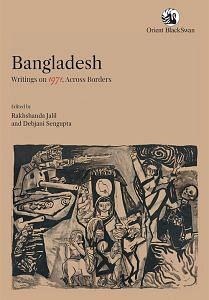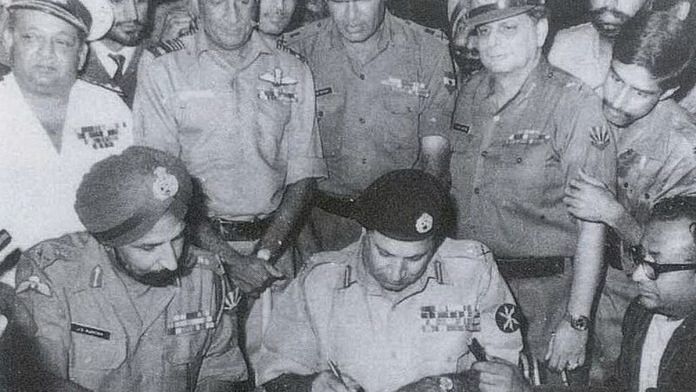My grandfather, Colonel Nadir Ali, in the autumn of his life often spoke about 1971. Deployed to Dhaka on 10th April, he served as the second, and then first, in command of the 3rd Commando Battalion until October 1971, when he was sent back to West Pakistan for a promotion. On the morning of his departure from Dhaka, he eschewed his uniform for a traditional dhoti and wandered over to the Rangamati lake. He got onto a small nauka and shared dal-bhat with the surprised boatman. As he would describe it, he imagined himself—in that moment—not as an occupying officer but a resident local. ‘I completely lost my mind,’ Dada would say with a shrug, the bizarre episode marking the beginning of a mental breakdown that would eventually see him hospitalised for six months, temporarily losing his memory, and prematurely retired from the army.
‘Were you scared?’ I asked him once, understanding his saga—of both war and madness— as one of violence, trauma, and fear. ‘Oh no!’ he said. ‘Once you cross the border as a madman, you go into a fool’s paradise.’ In his voice was neither pain nor shame but a kind of gentle remorse. It betrayed an attachment, even a fondness, for his old delusions—the impossible imaginings they engendered, the alternative belongings they enabled.
What did Pakistan lose in 1971? A war, certainly, but also a part of itself—akin, as others have put it, to the loss of a limb. As Yasmin Saikia has argued in her work with both victims and perpetrators, what was also destroyed was insaniyat or shared humanity: a loss of the fundamental ethics of tolerance. Pakistan’s continued refusal to acknowledge, let alone apologise for, the evidence of rampant army atrocities, rapes, and selective genocide certainly testifies to this immeasurable moral abscess. It also calls attention to the striking absence of public memory around the conflict—summarised in school textbooks only as an Indian conspiracy, virtually ignored in cultural and public life. Many have labeled this silence an effect of ‘collective amnesia,’ a process of selective erasure in the service of national selfhood and myth-making. When compared to the highly contested and politicised nature of memorialisation in Bangladesh, where the war remains, in many ways, an active battleground (upon which national identity, politics and values are forged and fought)—this silence can sometimes seem deafening.
Also read: Pakistan’s apology to Bangladesh is a thorn in the throat. Neither can move past it
Confronting silence with the multiplicity of narrative(s), distortions with their corrections, and gaps as an absence to be filled, the logic of recovery aspires, ultimately, to construct a more complete and inclusive truth: as an avenue for resolution, understanding, and even healing.
The indisputable importance of such projects—and the promise of ethical reconstruction and historiographical challenge they hold—is what first drew me to my grandfather’s story. His anecdotes were replete with examples of the callousness and violence he encountered at the hands of his peers, beginning with his first action in Faridpur. ‘I was given orders to kill as many bastards as you can,’ he recounted, ‘and to pick out the Hindus.’ When Dada refused, saying he would neither discriminate between Muslims and Hindus nor would he fire on unarmed civilians, he was told:
‘You have just come from West Pakistan, teaching your Bengali students and drinking with your Bengali friends. You don’t know what has been happening here.’
Aside from departing from the official army line, Dada also expressed a rare readiness to share his account publicly. In 2011, he travelled back to Dhaka to speak about his war experience. ‘I, unfortunately, was a witness and participant in those events, though I never killed anyone or ordered anyone to be killed,’ he said in his address.‘In the army, you wear no separate uniform. We all share the guilt.’ In closing, he offered a personal apology.‘Now, as a Punjabi poet and writer I offer apologies and ask forgiveness from those who suffered so terribly in 1971.’
Dada’s apology followed in the footsteps of a small minority of Pakistanis—writers, intellectuals, activists—who have condemned the army action over the years. Progressive poets such as Habib Jalib and Ahmad Salim, activists such as Tahira Mazhar Ali and I. A. Rehman, and journalists like Waris Mir braved state repression to raise their voices against the war as early as March 1971 (and were punished for their efforts). Their acts of resistance—centred around the ethical imperatives of witnessing—form a limited counter-archive to that of silence, by refusing to be mute spectators to atrocity and violence. In an ‘Open Letter to President General A. M. Yahya Khan,’ written on 7 April 1971, Malik Ghulam Jilani condemned the regime’s actions, asking:‘I am not being brave. Who can be brave in fratricide? The days of bravery are over.’
The character of this dissent—of truth against silence, of witnessing against erasure, of individual morality against the barbarity of the regime—orients itself, first and foremost, against the Pakistani state. But it also creates the space for a certain critique of the very basis of Pakistani nationalism, throwing bare the violent exclusions at the heart of the nation-project. As Naveeda Khan has powerfully argued, the attempt to reckon with the foundations of Pakistani nationhood can be found, more broadly, in the ‘intellectual soul- searching’ of the post-71 period: in the growing preoccupation with origins and narratives of failure. The foundational crisis of 1971 reverberates both into the future—in the ethnic tensions and violence which continue to plague Pakistan—and the past, all the way to the tenuous birth of the Pakistan idea itself.
The contested relationship between 1947 and 1971 presents dual narrative possibilities: while ‘official’ historiography reads independence as a triumph and 1971 as a betrayal, an alternative narrative sees problematic origin and inevitable failure. While the first serves the project of nationalism, the other labels nationalism as the cause— with war, violence, and separatism as its effects. Either way, the lens of the nation is ultimately evaluative; the success of Bengali nationalism indicating the intrinsic deficiency of Pakistan’s. The question then becomes: was Bengali independence inherent to the Pakistan idea itself? Was the break-up of Pakistan inevitable?
Also read: Govt and military owe India an authentic history of the 1971 Bangladesh War. Rest is mythology
Before the war, my Dada was posted in Dhaka for four years (from 1962–66), a time he often referred to as the happiest of his life. He joked with his Bengali friends, who would call each other ‘general’—the joke being, if East Pakistan went its own way, they would rise in rank. He remembered the real bonds of friendship, but also the feeling of distance between the West Pakistani officers who dominated all the senior posts, and the Bengali officers who made up the majority of his cadre at the Ordinance Depot.‘They spoke in Bangla to each other and in English to us.’ Dada attended a Bangla language class, which was offered to the officers on a voluntary basis. He remembered seeing the list of verbs and discovering that they were all common with Punjabi.‘Name any and I’ll tell you,’ he said to me, ‘Kore? Kare. Khaoya? Khana. I even knew some of the words which were not known to most Punjabis in Punjabi—which came from that very rural kind of Punjabi. Like doka (to enter). I thought, then, that it won’t be very difficult to learn.’
But Dada never did learn the language; although he grew to love Bengali culture. Once as a young major, he was made administrative- in-charge of his service—where during lunch-break, music would be played on the loudspeaker. He put on Rabindra Sangeet, although Tagore songs were banned by the government at the time. ‘I, in the heart of my hearts, was a very pro-Bengali person, pro- East Pakistan,’ he once told me.‘But I suppose it could only go that far—music, conversation, Bengali friends.’ Despite his fondness for the people and the culture, Dada volunteered for deployment when the war broke out.
When Dada entered, as he put it himself, ‘the fool’s paradise,’ he lost his memory. He told me, often, of the alternate reality he was living in then—before his treatment and recovery. ‘I thought Pakistan and India were going to become one,’ he remembered, ‘I was creating a People’s Republic of India; that was the plan.’
When Faiz Ahmad Faiz visited Bangladesh in 1974 and received, as the story goes, the cold shoulder from his old literary friends—he felt this pain of possibilities lost. He returned to write this famous verse:
Hum keh thehre ajnabi itni mudaraton ke baad Phir banenge aashna kitni mulaqaton ke baad
Kab nazar mein aayegi bedaag sabze ki bahar Khoon ke dhabbe dhulenge kitni barsaaton ke baad
We are now strangers again who have known each other as friends
How many meetings will it take for us to know each other again?
When will our gaze behold the bloom of green fields
How many rains will it take to wash away the blood stains?
For Pakistan, at least, a true reckoning with the tragedy of 1971 would mean reckoning not only with the violence and brutality, but with all the things that were lost.
 This excerpt from ‘Bangladesh: Writings on 1971, Across Borders’ edited by Rakhshanda Jalil and Debjani Sengupta, has been published with permission from Orient Blackswan.
This excerpt from ‘Bangladesh: Writings on 1971, Across Borders’ edited by Rakhshanda Jalil and Debjani Sengupta, has been published with permission from Orient Blackswan.



